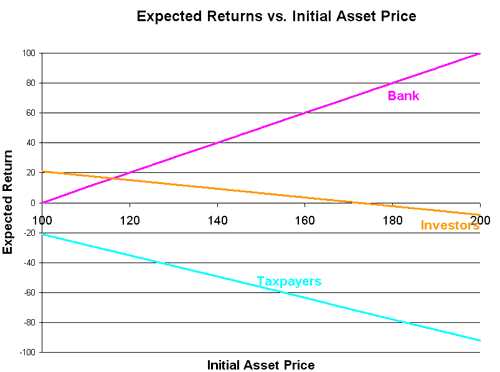We libertarians and critics of large government will often criticize this or that initiative as being misguided, or dumb, or counter-productive, or too costly, or whatever. Too often we do so in the context of the particular personalities involved -- e.g. Bush is going to far, Obama made a mistake, Pelosi is trying to do something dumb. This tends to give the impression that these are individual mistakes, with the corollary that if we could just get better people in government, these mistakes would not occur.
I see this reaction -- that its the quality of the people, not the system itself, at fault -- all the time. Of course, it was a common one on the left for years during the Bush administration -- if only we had our guys, smarter guys, non-fundamentalist guys, scientific guys, whatever -- in there, things would work. Republicans, though, did the same thing for years with Congress -- if only we'd get those liberals out of the Congressional majority, we would run things intelligently (anyone remember the Contract with America?).
Two examples bring this most recently to mind. The first from Radley Balko:
This is sort of amusing. Salon writer Andrew Leonard concedes the unintended consequences of excessive regulation and bad lawmaking, walks right up to the edge of embracing libertarianism, then shrugs it off with, "And that might be one of the most distressing results of decades of being told that government is the problem "” we hear a story like Hayes', and think despondently, you know, they were right, rather than squaring our shoulders and reapplying ourselves to the wheel." Yeah. Keep reapplying yourself to that wheel. If we can just get the right people in charge"¦.
The second is perhaps the clearest statement of the fallacy I have ever seen, from the Washington Post's columnist Richard Cohen via Reason:
In Ronald Reagan's famous formulation, "government is not the solution to our problems; government is the problem." This statement, at the very heart of the so-called Reagan Revolution, denigrated government and the people in it. Reagan's statement withdrew John F. Kennedy's invitation to the intellectually gifted to come to Washington and see what they could do for their country. Reagan sent a different message. Government service is for the lame, the cautious. If you really want to do something for your country, shun Washington and make money. It was morning again in America -- whatever that meant.
It is to Barack Obama's immense credit that he has reversed Reagan's reversal. Washington crackles with people on a mission. Brains are once again in vogue, if only because Obama has them in abundance. Not for him the aw-shucks affectation of the previous eight years, when instinct was extolled and ideology trumped analysis. We are in a mess, and one of the reasons is that people who might have noticed or done something about it had been told to stay out of government.
In our scandal-soaked culture, it is de rigueur to denigrate public officials and to search for the inevitable conflict of interest. But here are people, such as [Lawrence] Summers, who have put aside wealth and lavish perks for government service. They have their reasons, sure, but whatever they are, we -- not they -- are the richer for it.
Seriously, gag me with a spoon. Forgetting the fact that these guys are sacrificing nothing, and in fact get rich fast after office based on the power and contacts they have amassed, this just really misses the point.
The problem is not bad people. In fact, I have said for years that with a very few exceptions, there are no bad people in government. There are just 1) really bad incentives; 2) really bad information; and 3) problems that are not amenable to command and control.
People who believe as do Cohen simply will never accept #1 and #2, no matter how much evidence is brought to bear. We ought, they say, to be able to find public service monks who are both brilliant and un-swayed by such incentives or information asymmetries. Sure, the incentives are to deliver benefits to small, visible, powerful minorities even when those benefits dwarf the costs, as long as those costs are dispersed and less visible. But their guy will be smarter and will avoid this trap. Never mind how many free trade economists turn into protectionists once they enter the administration, succumbing to the pressure of the visible (e.g. GM jobs) over the logic of the invisible.
But lets look at #3, because this does not get nearly enough attention. It seems incredible to me, particularly in current times, but how often do you hear someone make the case that the government simply cannot achieve a certain goal? Almost never. We argue about expense and constitutionality, as we should, but is it even possible for even the smartest people to make GM profitable this year? Or to make toxic bank assets go away without economic pain? Or stop a sufficiently motivated terrorist from killing people? Could it be that we simply have to endure a recession, rather than firing off trillions of dollars to try to "do something" about it?
One of the things that I have learned as a systems-dynamics specialist in mechanical engineering is that there are systems out there so chaotic and so complex we cannot hope to even adequately describe them, much less effectively manage them. The details of flow in a waterfall, of a smoke plume from a cigarette, of weather and climate ... and of the economy and individual action in a society are so complex as to defy human understanding.
Our interaction with the natural world is a great example. We used to act with a certain hubris - like, "we can manage the deer population." I think several decades of trying to "manage" animal populations have taught us a certain humility. What if, for example, we wanted to increase the deer population in Yellowstone? Well, we could put out feeders full of corn, but we might then find that by domesticating the deer, we have in fact doomed them long-term. We could kill their natural predators, but we might find that these predators were also eating something else, possibly something that competed with the deer. We could kill whatever competes with the deer for food, but again we might cause imbalances in other populations. Or we could actually be successful, and increase the deer population, and then find it quickly devastated as they outgrow their food supply and habitat area.
We describe these problems by saying that these actions in complex systems carry "unintended consequences". The problem is that when I use this term in a political world the reaction is "well, that's just an artifact of poor design - my guy will be smart enough to avoid them." But here is another way to put it: "Unintended consequences" is a simple way of saying that in a nearly infinitely multi-variate, hugely complex system (like the economy), it is impossible to narrowly target changes to a single variable without all the other variables in the system being effected, often in ways impossible for us to predict in advance. In this context, "unintended consequences" are not avoidable design defects -- they are absolutely required. They are unavoidable. They are an absolute fact that politicians cannot wish away (but if they are clever, they can hide, at least until after reelection).
Sometimes, I wonder how my education had such a different impact on me than on others. I could easily be called part of the over-educated elite -- magna cum laude at Princeton, first in my class at Harvard Business School. Folks with similar backgrounds in this administration seemed to have walked away from similar educations with a deep confidence that they can run or fix anything -- Take over GM, run it successfully where decades of industry experts have failed, manage its turnaround better than a coterie of experienced bankruptcy guys -- No problem! I just can't even imagine thinking this way. If anything, I walked away from my mechanical engineering degree with a deep sense that most complex systems would always be out of my analytical reach, and I walked away from Harvard Business School with an understanding of just how hard it is, even as the top boss, to move and drive change in large organizations.
Some older thoughts on this topic, in relation to technocrats, here.




